January 1755
[see Index for backgound so far]
Memorandum: 20th January 1755
|
 |
I came to a determination, to begin keeping a regular Diary (as God shall enable me) of the state and daily frame of my soul, and the gracious dealings of God unto me. The advice and experience of others who have left upon record, the benefit they have found by this practice, has long made me desirous to imitate them; but something from within or without has still hindered. Lord accept me, and prevent my resting upon any forms, or finding any satisfaction in them, farther than as they lead to thee. Amen.
As merchants begin their books with an inventory of stock, so would I in a brief manner set down my present state for my future government. [1] I trust that the Lord has caused more of his goodness to pass before me this year than I ever before experienced. I hope particularly he has taken me more off my own bottom, and given me to see more of the necessity and the sufficiency of the Lord Jesus Christ in his office of Saviour of his people – and has made me more willing to depend upon his righteousness only. I trust he has enabled me, to see more clearly the truth and comfort of those peculiar doctrines of the glorious Gospel, which in these days are by many either denied, or explained away. I have been led too of late into better opportunities than I formerly had, particularly in my acquaintance, which I have contracted with several experienced Christians, [2] whose belief and hopes are a confirmation of my own, convincing me that though there is a diversity of operations, it is the same Spirit that worketh in all.
On the other side I labour under weakness, I am wearied with a body of sin and death, often when I would do good evil is present with me; my affections are cold and wavering, my faith weak and interrupted. Thus I find my life to be a continual warfare. [3] But blessed be God for the hopes of final victory over sin and corruption, through Jesus Christ our Lord, by whom I hope I can in a low degree say, the world is crucified to me, and I unto the world. [4]
In temporals I have to praise God for health, sufficiency, peace, content; from his goodness all I have proceeds, and his grace has taught me to say: It is enough – I mean for the present, and I desire to trust him for the future, for he has said I will never leave thee nor forsake thee. [5]
|
|
Monday 20 January 1755 |
|
|
Rose at 7. Private [devotions] till 8; frame [of mind] not altogether cold; was led to pray for more knowledge in the mystery of godliness in the person of Christ; [6] according to what I have read of late in Dr Owens’s Christo. [7]
In the forenoon an hour in prayer, and read, Scripture with _[my dear Polly]; then walked to Dock [8] and Brumpton; [9] saw Mr D, [10] conversed with Mr Mc [11] chiefly about the freedom of grace and charity due to fellow Christians. PM: wrote Mr Brewer [12] – invitation down – etc. |
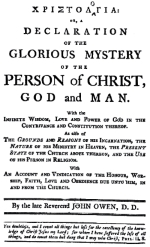 |
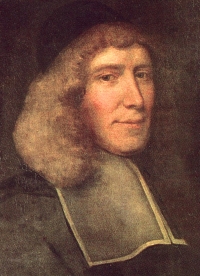
John Owen |
|
Thursday 21 January |
|
|
|
AM: overslept, dull frame. I know not if the heaviness of the weather affected me – found myself cold, languid and trifling all day. Stayed within doors on account of rain, reading various: amongst others a journal and defence of Mr Wesley. [13] Know not what to say of his account of the manner in which so many of his hearers were awakened, only that I never met with any instance of the kind I could depend on. Yet there seems to be a spirit of sincerity and gospel zeal for gospel truths in his writing, and be the errors of him or his followers what they will, I believe God has been pleased to make him an instrument of good – Lord carry on and increase thy work in thy own way, and teach me to honour a principal of grace wherever I find it, though mixed as it must more or less be with human weakness. |
|
Wednesday 22nd January |
|
|
|
Still very cold, barren and wandering in all my duties, but blessed be God in some measure enabled to plead that better righteousness than my own, which is provided for poor sinners. Walked in the fields in hopes of finding an enlargement, but instead thereof got into a fruitless scheming set of thoughts. I find the world still too much in my heart, but I hope am desirous to be raised above it. O that my failings might at least teach me humility, and convince me more effectually how frail I am. Passed the evening with the freemasons, a fellow-crafts lodge; [14] prayer etc with _[my dear Polly], [15] but sadly contracted. Nothing particular in my reading, but hope I desire to trust in that divine providence which led Jacob from his father’s house and increased him to two bands. [16] Surely my experiences hitherto have not been less wonderful, and worthy acknowledgement than his. Praise the Lord O my soul. [17] |
|
Saturday 25 January |
|
These three days past, have not found much alteration if any, I hope not for the worse.
Walking in the fields Thursday and yesterday was something stirred up to praise my Gracious God for all his blessings, and to lament my coldness. Have found a little enlargement in my morning exercises, and upon the whole I hope that though I cannot get rid of my corruptions, I am sincerely desirous to strive against them, and to be humbled under them. Some letters I have met with of Mr Whitefield [18] and others, have led me to adore the free grace of God in them, and while my heart was warm, I humbly submitted myself to the guidance of the same Spirit. Though I have no cause to subscribe myself their followers, yet I cannot but admire and respect many of them, for I know not where I have found such expressions of love to God and man, such marks of humility and zeal for the glory of the gospel, as amongst them. |
|
|
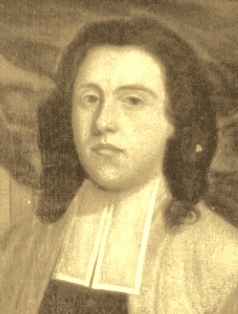
Joseph Alleine |
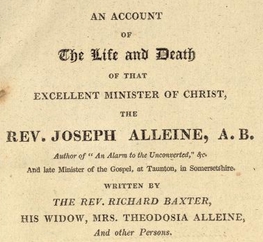 |
|
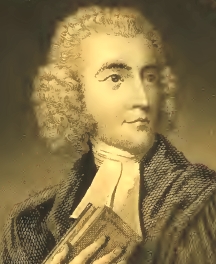
Thomas Halyburton |
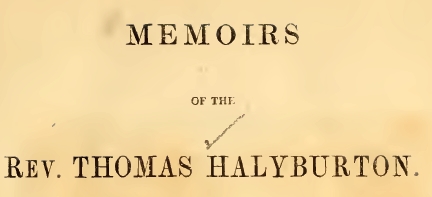 |
|
Purchased the lives of two noted servants of God deceased (Joseph Allen [19] and T Halyburton [20]).
Lord grant I may be profited by their experience, and animated by their example. |
This morning received a letter from my friend Mr M [21] relating (amongst other things) to a settlement. When I came home, retired and laid the business before the Lord, requesting that he would be pleased to direct me in this and all other concerns, to what may be most for his glory and my own good. I pleaded for this from his gracious promise: Proverbs 3:5,6. [22] The thing mentioned will, I think, be suitable enough; if it is, I know his goodness can remove every obstacle – and blessed be his holy name, he inclines my hard, unbelieving heart to depend upon him.
Memo: Upon several occasions, I have lately been surprised into great warmth[intense emotion] in argument, and a hasty way of speaking quite unsuitable to my better judgment. Lord forgive my pride, which occasions it, and give me the wisdom, from above, gentle and easy to be entreated. [23]
Set apart the evening to review the circumstances of the week past, to confess and to praise accordingly, and to prepare my mind for the approaching Sabbath. Lord do thou work in me and for me. |
|
Sunday 26th January |
|
|
|
Much heaviness and worldly thoughts through the whole of the day, and engaged in trifling, vain discourse, by an old acquaintance paying me a visit which I could not put off, and absent myself from. Was at church [24] and chapel. [25] |
 |
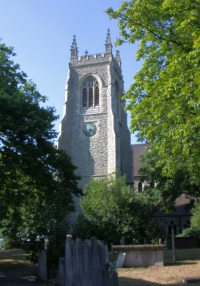 |
Catlett family |
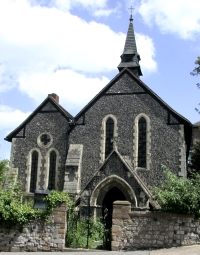 |
Newton's father-in-law, George Catlett,
was baptised at St Mary's, 11 July 1701:
 |
|
A vestry member in 1729 and 1730,
Catlett was a sidesman from 1731 to 1734
|
|
St Mary's church, Chatham
home church to the Catlett family
Newton's own mother,
his mother-in-law and several siblings of his wife Mary are buried here
|
In 1735 and 1736 he was
Minister's Church Warden
|
St Bartholomew's chapel
originally part of St Bartholomew’s Hospital, Rochester,
founded in 1078
by Gundulph, Bishop of Rochester
|
|
Mr F [26] preached both times: the first from Leviticus 19:17, [27] the second from Psalm 119:67. [28] Poor general discourses, yet I may take a word of admonition, especially with regard to the duty of reproof. Many calls of this kind passed unimproved for want of zeal and prudence. As to the advantage of afflictions, I can set my seal to it from experience. |

Waler Frank
minsiter at church and chapel |
|
In the evening heard one Gregory [29] at the Methodist Meeting [30] upon John 3:15 [31] – a sound warm discourse, and I hope my heart was something affected: when he showed how far a profane and carnal person may attain in the profession of the belief of the gospel without a change of heart, and directed us to examine our own hearts if we could offer nothing farther, I trust the Lord witnessed to my conscience, that he had done more for me – that mine, though very weak, was a living faith, and proceeded from such principles, and in its measure produced such fruits as he after described. |
|
Blessed be God for Grace, free grace, enlightening, strengthening, sanctifying, pardoning and evidencing grace.
|
|
Lord the work is thine, thine be the praise. In his prayer he made a pathetic[emotional] confession of our national sins, owning and deprecating the Lord’s judgements. In this my heart was led to join. Surely as a people we have done very wickedly, and sinned against the richest dispensations and most wonderful deliverances: again and again the Lord has been entreated for us, when he was seemingly just striking, yet we have provoked him with evil anew. Lord spare us even yet, and bless us in turning us from our iniquities; and give me a zeal for thy glory, and compassion for the souls of careless offenders, that I may mourn before thee for what I cannot prevent. |
 |
Wrote Brother Clunie. [32] Concluded the day in prayer as usual, a little more enlarged than I have been in an evening of late. Strong reports of an expected war, hurry of armaments by sea and land. [33] I praise the Lord I find his Holy Name to be a strong tower, and a sure hiding place. The Lord reigneth, let the people be never so unquiet. [34] |
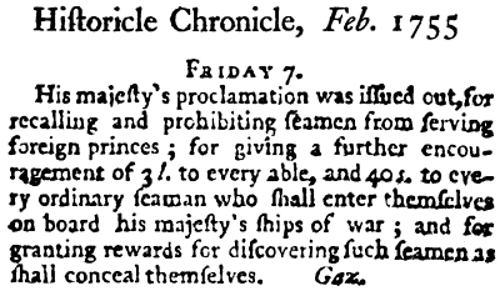 |
|
Monday 27 January |
|
|
|
Nothing very remarkable today. Hope I found some warmth and reality in my devotional exercises – adored be Grace for it, that can work upon [a] so fallen, helpless creature. Scripture Lessons Genesis ad fin [35] and John 18:19,20. [36] O may I imitate Joseph, but more especially the Lord Jesus if ever called to suffer for righteousness sake, and leave it to him who knows my case, to take care of it. Read a good deal of Mr Halyburton’s account of his experience, [37] from which I desire to learn more of the deceitfulness of the human heart, and more of God’s wonderful working. Wrote to Mr M [38] concerning his of the 25th. Afterwards retired into the fields and recommended the event, to the Lord who has commanded me to cast my care upon him; [39] and this I endeavoured to do likewise in the morning. Lord forgive the faults, follies and trifling behaviour of this day, for my surety’s sake. Amen. |
|
Tuesday 28th January |
|
In the forenoon walked in the fields; had a pleasant, comfortable time; was led into a farther and more particular surrender of myself to divine providence, especially in a view which for some time past, has been a good deal on my mind, though at present I see no opening that way. [40] If it is the Lord’s will, he can find means, and in that case I profess myself ready. Mr Halyburton’s experience I hope will be of use to me. O the deceitfulness of sin, but blessed be God, through the Lord Christ – grace has much more abounded; though circumstances differ, the same work is carried on in all his children: the exalting God and debasing the creature is the constant effect. I trust I can set my seal to this way. Scripture Lessons: Genesis 45,46,47; Matthew 25. O why was not I one of those to whom the door is shut? [41] Read more of Dr Owens’s Christologia , a rich book, but the style something obscure. Lord enable me to understand more and more of that mystery. [42] |
[ last entry for January 1755]
|
Endnotes: |
|
[1] |
It was customary for Newton to take stock at the beginning of each year. He continued this habit throughout his Christian life. For instance, on 31 December 1772, the night before Amazing Grace was first introduced to the world, he wrote: ‘Here I repeat my vows and set up my Ebenezer to his praise. It is more than 16 years since I began to write in this book. How many scenes have I passed through in the time. By what a way has the Lord led me. What wonders has he shown me! ...O Lord accept my praise for all that is past, enable me to trust thee for all that’s to come’. On 1 January 1775 he wrote: ‘I would begin the New Year with praise for the mercies of the past, and with a new surrender of myself and my all to the Lord.’ |
|
[2] |
Newton had left off his writing in his diary for several months. His previous entry before this Memorandum was at sea on 5 July 1754, after leaving St Kitts. From future entries it is evident that in the interval before he resumed writing here, he had met with some of Clunie’s London contacts – e.g. the last sentence for 20 January 1755 shows that he already knew Brewer well enough to invite him down to Chatham and on 3 February 1755 he attends the society at William May’s as one already accepted. |
|
[3] |
See for instance his later hymn ‘The inward warfare’, drawing on Galatians 5:17, in Olney Hymns, Book 1, Hymn 130, Strange and mysterious is my life and Book 3, Hymn 30, ‘Why should I complain?’, verse 5:
While I dwell in an enemy’s land,
Can I hope to be always in peace?
(This latter hymn was written while working as Tide Surveyor in Liverpool; Newton based it on Polly’s favourite tune from the opera Eliza by Thomas Augustus Arne) [temporary link] |
|
[4] |
Galatians 6:14 But God forbid that I should glory, save in the cross of our Lord Jesus Christ, by whom the world is crucified unto me, and I unto the world. |
|
[5] |
Hebrews 13:5 Let your conversation be without covetousness; and be content with such things as ye have: for he hath said, I will never leave thee, nor forsake thee. |
|
[6] |
1 Timothy 3:16 And without controversy great is the mystery of godliness: God was manifest in the flesh, justified in the Spirit, seen of angels, preached unto the Gentiles, believed on in the world, received up into glory. |
|
[7] |
John Owen, Christologia, or a Declaration of the glorious Mystery of the Person of Christ…, 1677 |
|
[8] |
Chatham Dockyard was one of the three Royal Dockyards (the others being Plymouth and Portsmouth). It employed thousands of skilled workers in a variety of trades. Polly’s father George Catlett supplied bread and flour to the Dockyard Victualling Office. Supplies were stored on a hoy at the water’s edge close to their house. |
|
[9] |
Brumpton, more commonly called Brompton, was a village (now a town) overlooking the Dockyard. Brompton Barracks became home to the Royal Engineers in 1812. |
|
[10] |
From later entries, beginning 9 May 1755, and a comparison with Stepney Independent Church records, this is probably John Duncan – perhaps the John Duncan who married Mary Mayow at St Mary’s Chatham, 17 July 1765, with Robert Rutherford as witness. |
|
[11] |
From later entries, e.g. 18 May 1755, this is probably Mr McGregor – not yet identified. |
|
[12] |
Samuel Brewer (1724-1796), Pastor of Stepney Independent Meeting – the church attended by Captain Alexander Clunie (d.1770), who first introduced Newton to Brewer. Newton and Brewer were almost the same age. Brewer became a mentor to Newton in his early Christian life. Along with all the ladies of Stepney Independent, Polly (Mary Newton) took a shine to ‘dear Mr Brewer’. This diary entry was probably occasioned by Newton begging Brewer to come and preach in Chatham, where there was a dearth of Biblical preaching. |
|
[13] |
John Wesley (1703-1791), itinerant evangelist, one of those Anglicans nicknamed ‘methodists’ while at Oxford, who, with George Whitefield of the same Oxford group, was being used of God in the national Awakening. Hindmarsh suggests:[?An extract of the Reverend Mr John Wesley’s journal, from November 25, 1746, to July 20, 1750 [sic, 1749] (1754)]; [?Free-grace. A sermon preach’d at Bristol (4th edn, 1754)]. Several similar tracts were published at this time. |
|
[14] |
Possibly the Royal Kent Lodge of Antiquity No. 20, founded in London in 1723 at the Anchor, Dutchy Lane, Strand, London. In 1748 the lodge moved to the Queen's Head, Red Cat Lane, Chatham, and to the Bunch of Grapes in 1751. Later this year, 27 August 1755, Newton attended the Freemason’s Lodge in Liverpool, and concluded “I begin to think an attendance there will not do… there are so many improper members made, and so much of what the world calls good fellowship crept in, that I am weary of it, and I can hardly expect to see those good views brought about for which I once attended.” |
|
[15] |
A seemingly redundant ‘2’ is here in the ms |
|
[16] |
Genesis 32:10 I am not worthy of the least of all the mercies, and of all the truth, which thou hast shewed unto thy servant; for with my staff I passed over this Jordan; and now I am become two bands. |
|
[17] |
Psalm 146:1 Praise ye the Lord. Praise the Lord, O my soul. |
|
[18] |
George Whitefield (1714-1770), itinerant evangelist, was in America at the time of this diary entry. Hindmarsh suggests [?A letter to the Reverend Mr John Wesley: in answer to his sermon entitled, Free-grace (repr, 1752)] |
|
[19] |
Joseph Alleine (1634-1668); Theodosia Alleine, The Life and death of Mr Joseph Alleine, 1672 |
|
[20] |
Thomas Halyburton (1674-1712); An extract of the life and death of Mr Thomas Halyburton, e.g ed. John Wesley, 1747 (2nd edition) |
|
[21] |
Joseph Manesty (d. 1771) of Liverpool, friend of Newton’s father, who took Newton under his wing after the Captain’s death. The ‘settlement’ regarded employment as a land-waiter. Rupert C Jarvis, in Customs Letter-Books of the Port of Liverpool, 1711-1813, defines a land-waiter as “the officer who superintends the lading and unlading of all goods imported or exported, until they have passed through official control”. |
|
[22] |
Proverbs 3:5,6 Trust in the Lord with all thine heart; and lean not unto thine own understanding. In all thy ways acknowledge him, and he shall direct thy paths. |
|
[23] |
James 3:17 But the wisdom that is from above is first pure, then peaceable, gentle, and easy to be intreated, full of mercy and good fruits, without partiality, and without hypocrisy. |
|
[24] |
St Mary’s Chatham, where Newton’s mother was buried in 1731 (she had died while staying with the Catletts). See also information box. |
|
[25] |
St Bartholomew’s Chapel, in Gundulph Road, a two-minute walk from the Catlett’s home. The chapel was part of St Bartholomew’s Hospital, Rochester, founded in 1078 by Gundulph, Bishop of Rochester. It practically marks the boundary between Chatham and Rochester. ‘Even as soon as 1559’ the chapel was spoken of as ‘old and ruynous and like to come to utter decaie’. It is now the only remaining portion of the Priory of St Bartholomew. Sir George Gilbert Scott (1811-78), grandson of Thomas Scott who was converted through Newton’s subsequent ministry, renovated it in 1877. The chapel is now privately owned. |
|
[26] |
Walter Frank (1702-1784) was the perpetual curate of Chatham from 1747. He was also a minor canon of Rochester Cathedral from 1733. Walter was born in Cranfield, Bedfordshire, less than 10 miles from Olney, where Newton would later exercise his first ministry in the Church of England. Frank’s son Thomas (1730-1794) had been ordained in 1754 and was also curate of Chatham from 1757. |
|
[27] |
Leviticus 19:17 Thou shalt not hate thy brother in thine heart: thou shalt in any wise rebuke thy neighbour, and not suffer sin upon him. |
|
[28] |
Psalm 119:67 Before I was afflicted I went astray: but now have I kept thy word. |
|
[29] |
Gregory’s identity not yet known. |
|
[30] |
The word ‘methodist’ at this time was poorly defined, most closely perhaps used here as an adjective comparable to ‘evangelical’ (see Fn 13). There was as yet no Methodist denomination. The methodists in Chatham were chiefly followers of George Whitefield (more info coming in Feb 1755 endnotes). The Sunday meetings were held early and late in the day so as to allow members to attend the parish church services, which they were encouraged to do, for their doctrinal allegiance was with the 39 Articles and the Liturgy of the Church of England. |
|
[31] |
John 3:15 That whosoever believeth in him should not perish, but have eternal life. |
|
[32] |
Captain Alexander Clunie (d. 1770), whom Newton met in St Kitts (St Christopher’s), where Clunie had explained to Newton the principle of justification by faith and advised him on access to sound Biblical teaching (see Newton’s Narrative, Letter 13, where he describes his meeting with ‘a captain of a ship from London’). |
|
[33] |
France and Britain were preparing for war over border disputes in their North American territories. On 23 January 1755 a proclamation was issued ‘encouraging’ seamen to volunteer to serve on his Majesty’s ships of war by offering them bounty-money. Those not moved to feel ‘encouraged’ were to be press-ganged into service. 200 Greenwich Hospital pensioners volunteered for the fleet. Chatham Dockyard commissioned fifteen sailing ships. Even those returning home from long sea voyages were not exempt from being placed under severe pressure from the Navy, as politely reported in The Universal Magazine on 30 January 1755: ‘His Majesty’s yachts are cruising in the channel, to pick out able-bodied seamen out of the homeward-bound vessels.’ |
|
[34] |
This is a quote from Psalm 99:1 The LORD reigneth; let the people tremble: he sitteth between the cherubims; let the earth be moved. (KJV) and The Lord is King, be the people never so impatient: he sitteth between the cherubims, be the earth never so unquiet. (Book of Common Prayer 1662) |
|
[35] |
ad fin: to the end |
|
[36] |
John 18:19,20 The high priest then asked Jesus of his disciples, and of his doctrine. Jesus answered him, I spake openly to the world; I ever taught in the synagogue, and in the temple, whither the Jews always resort; and in secret have I said nothing. |
|
[37] |
Written ‘H_n’, but we know from Newton’s entry on 25 January that this was Halyburton. |
|
[38] |
Joseph Manesty of Liverpool, who had urged Newton to apply for the position of tidewaiter in Liverpool (see 25 January) |
|
[39] |
1 Peter 5:7 Casting all your care upon him; for he careth for you. |
|
[40] |
This may refer to Newton’s desire for Brewer to send a Gospel minister to remain at Chatham. Yet he goes on to say ‘I profess myself ready’. Could this – additionally – be an early indication of his longing to enter the ministry? |
|
[41] |
A reference to his reading in Matthew 25:10 And while they went to buy, the bridegroom came; and they that were ready went in with him to the marriage: and the door was shut. |
|
[42] |
As in Fn 7, John Owen, Christologia, or a Declaration of the glorious Mystery of the Person of Christ. |
Acknowledgements
Princeton University, John Newton Diary, CO199
Dr Catharina Clement
The Parochial Church Council of St Mary and St John Chatham
Medway Archives and Local Studies Centre
KJV reproduced by permission of Cambridge University Press, the Crown’s patentee in the UK
© The John Newton Project 2016
www.johnnewton.org
|